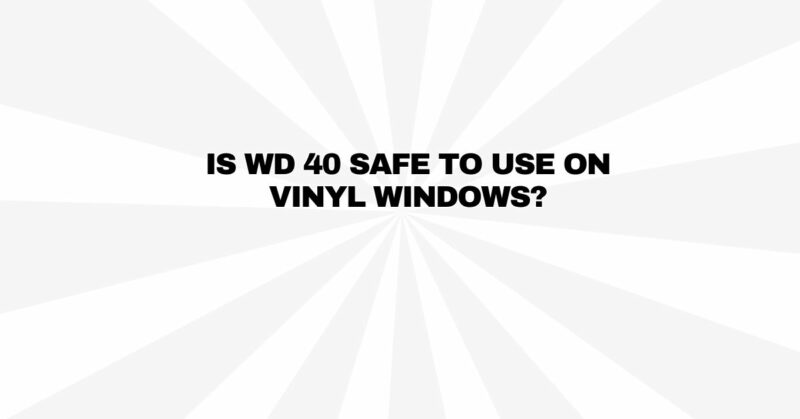When it comes to maintaining and cleaning vinyl windows, homeowners often seek effective solutions that will keep their windows looking clear and pristine. WD-40, a versatile household product known for its lubricating and cleaning properties, is occasionally considered as a potential option. In this article, we’ll explore the use of WD-40 on vinyl windows, its potential benefits, and any associated risks.
Understanding WD-40:
Before discussing its use on vinyl windows, it’s important to understand what WD-40 is and what it’s typically used for. WD-40 is a multi-purpose lubricant and penetrating oil that was originally developed for industrial and aerospace applications. Its name stands for “Water Displacement, 40th attempt,” indicating the number of tries it took to create the formula.
Using WD-40 on Vinyl Windows:
Using WD-40 on vinyl windows is a topic that has sparked some debate among homeowners and maintenance enthusiasts. Here are some considerations if you’re contemplating using WD-40 to clean or maintain your vinyl windows:
Pros:
- Removes Stubborn Stains: WD-40 is known for its ability to dissolve and loosen stubborn residues, such as adhesive remnants from stickers, tape, or other contaminants that may be stuck on your vinyl windows. It can effectively break down these substances, making them easier to remove.
- Restores Shine: In cases where vinyl windows have accumulated surface dirt and grime that regular cleaning solutions struggle to eliminate, WD-40 can potentially restore their shine and luster.
Cons:
- Potential Damage to Vinyl: The most significant concern with using WD-40 on vinyl windows is the potential risk of damaging the vinyl itself. WD-40 contains various chemicals, including petroleum-based solvents, which may react with the vinyl and lead to softening, warping, or discoloration over time. This could compromise the structural integrity and aesthetics of your vinyl windows.
- Residue and Stains: While WD-40 may remove certain residues, it can leave its own oily residue on the vinyl surface. This residue may attract dust and debris, making the windows dirtier over time. Additionally, any residue left on the windows may affect their appearance.
- Chemical Interactions: Vinyl windows are sensitive to chemical interactions. The chemicals in WD-40 may not react well with the vinyl material or any previous cleaning solutions that may have been used on the windows, potentially causing unforeseen damage or discoloration.
- Loss of Warranty: If your vinyl windows are still under warranty, using WD-40 or other non-recommended cleaning products may void the warranty. Manufacturers often specify the use of particular cleaning methods to maintain the warranty’s validity.
Safer Alternatives for Cleaning Vinyl Windows:
Given the potential risks associated with using WD-40, it’s generally advisable to opt for safer and proven methods when cleaning and maintaining vinyl windows. Here are some alternative approaches to consider:
- Mild Soapy Water: A solution of warm water and mild dish soap is a safe and effective choice for cleaning vinyl windows. Apply the soapy water with a soft cloth or sponge, then rinse and dry the windows with a clean, lint-free cloth.
- Commercial Vinyl Cleaner: There are commercial vinyl cleaning products specifically designed for use on vinyl windows. These products are formulated to clean without harming the vinyl or leaving residue.
- DIY Vinegar Solution: A mixture of equal parts white vinegar and water can effectively clean vinyl windows and remove stains. Apply the solution with a soft cloth, then rinse and dry the windows thoroughly.
- Avoid Abrasive Materials: When cleaning vinyl windows, avoid using abrasive materials such as steel wool, abrasive sponges, or harsh brushes, as they can scratch the vinyl surface.
Conclusion: Prioritize Safe Cleaning Methods
In summary, while some homeowners have considered using WD-40 to clean vinyl windows due to its effectiveness in removing certain residues, it comes with significant potential risks to the vinyl material and overall window appearance. Therefore, it’s recommended to prioritize safe and proven cleaning methods, such as mild soapy water, commercial vinyl cleaners, or vinegar solutions, to maintain the cleanliness and integrity of your vinyl windows without risking damage or warranty issues. Always consult the manufacturer’s recommendations for cleaning and maintenance to ensure the longevity and performance of your vinyl windows.

